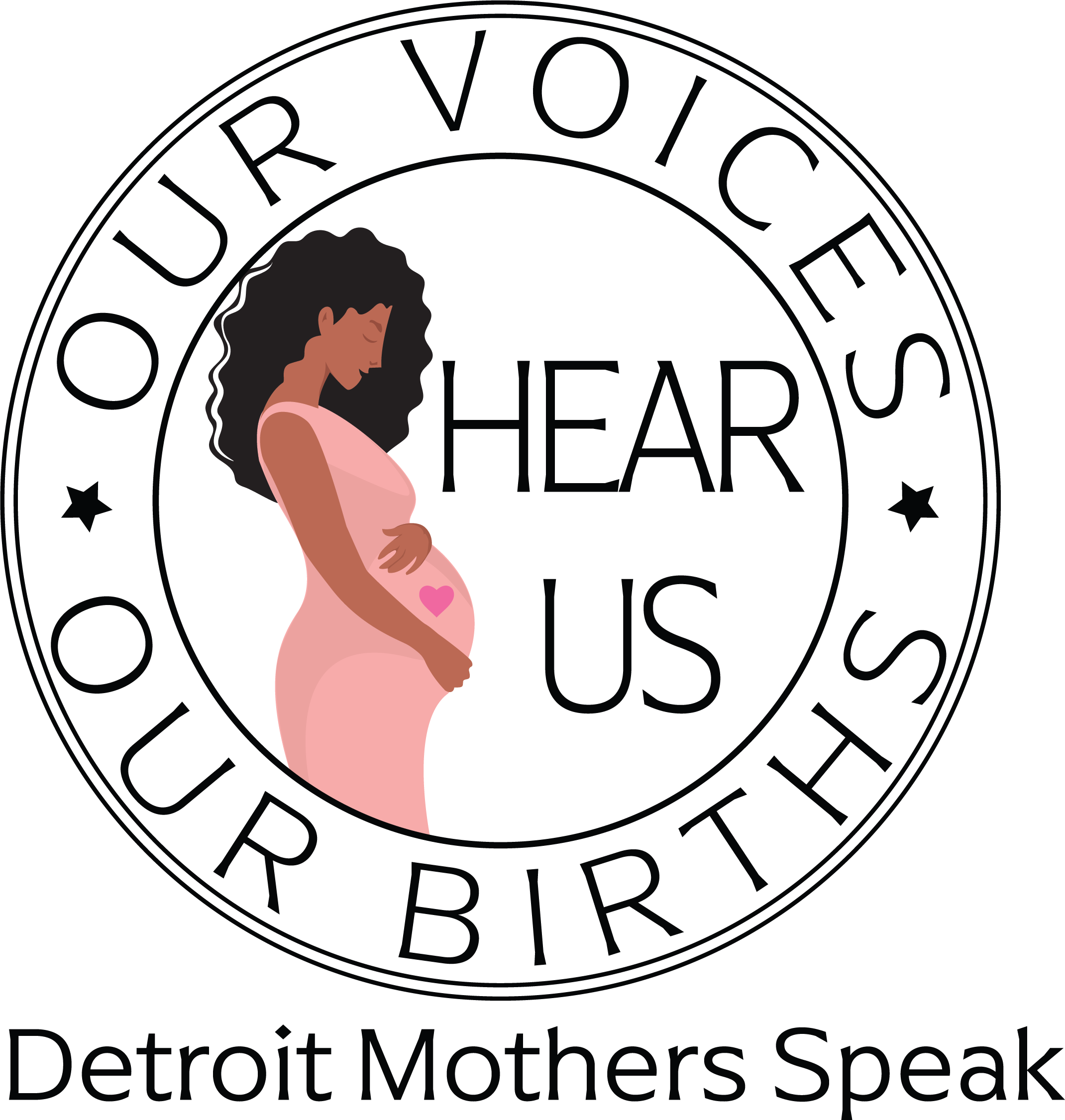
HEAR US! CAMPAIGN
EMPOWERING YOUR VOICE

STORYTELLERS VIDEOS:
Our Voices, Our Births - Hear Us!: Detroit Mothers Speak
The Hear Us! Campaign includes a series of short videos featuring local mothers sharing their birth stories. Women hearing the stories of other mothers’ birth journeys helps them know they are not alone and that they have choices. It helps women to know that they have a right to a respectful, joyful birth journey. The Hear Us! Campaign helps mothers advocate for themselves and others to create the necessary change to improve maternal and infant health and advance equity and respectful care with their healthcare providers.
Our Storytellers
Our Storytellers identified major themes including not being heard, not feeling respected, the importance of having support ... the benefits of having a Doula or midwife, mental health issues and postpartum depression, not having their birth plans honored, the use of Pitocin. C-Sections versus vaginal births after C-Sections, homelessness and isolation.
The videos can be used with professional healthcare training, OBG and medical grand rounds, community gatherings and church meetings, etc. Any opportunity to share these women's journey about what they experienced and what they want to experience will raise the awareness for the need for change.
These are the major issues we heard in their stories:
Not being heard
Having a birthing plan but not being respected ... not acknowledged
The benefits of having a Doula or Midwife Isolation ... not having contact
Mental Health and Postpartum depression
Not being supported
Pressured to have a C-section ... pressured to have a second C-section
The use of Pitocin
Premature Birth
Homelessness, unemployment ... issues that affect women in their daily lives and not considered in their doctor visits
Listen to our Storytellers as they share their birth journeys:
Questions to ask after viewing:
What impact do you hope the Hear Us! Campaign will have on the Detroit community?
How would these videos help women improve their birthing experience?
How could the videos be used to improve maternal healthcare?
Why should people watch the videos?
How can people support or learn more about this cause?

TOOL KIT:
EMPOWERING YOUR VOICE - Things Black and Brown Women Need to Know To Improve their BIRTH EXPERIENCE
Your birth journey should be joyous. Here are a few tips to help you prepare and advocate for a safe, equitable and respectful experience to welcome and enjoy your baby.
Before Getting Pregnant
Preconception health focuses on taking steps before getting pregnant to maximize your health and the health of a baby in the future. Although the tips outlined here by the Centers for Disease Control (CDC) are beneficial for all people, Black and Brown women are at higher risk of serious outcomes and advance planning of pregnancy may reduce that risk and ensure a better outcome.
During Pregnancy
Pregnancy is an exciting time, but it can also be stressful. Knowing that you are doing all you can to stay healthy during pregnancy and give your baby a healthy start in life will help you to have peace of mind. Click on this Centers for Disease Control (CDC) link to learn about …
Steps You Can Take Toward a Healthy Pregnancy
How Genetics and Family History Affect Pregnancy
Other Concerns During Pregnancy
Other Things to Think About Before the Baby Arrives
Create a Birth Plan
Your hospital will provide a birth plan document for you. A birth plan is a written outline of what you would like to happen during labor and delivery. This plan lets your obstetrician–gynecologist (ob-gyn) know your wishes for your labor and delivery. A birth plan is a great starting point, but you should be prepared for changes as the situation dictates.
Get a Midwife or a Doula
What is a Midwife?
A midwife is a trained health care professional who provides obstetric and gynecological services to birthing women before, during and after delivery. They are trained to assist in holistic birthing processes, such as non-medicated births or natural births from home as well as help women give birth without medical interventions, such as inductions and pain treatments.
How to find a midwife?
You can find a midwife through your healthcare provider, hospital or birthing center.
What is a Doula?
A Doula is a certified non-clinical support person trained to provide emotional, physical and informational support before, during and after birth. Women report that having a Doula greatly improved their birth journey and experience. Learn more about Doulas here … What Is a Doula? (webmd.com).
How to find a Doula?
You can find a Doula who serves pregnant women in the Greater Detroit area through the Black Mothers Breastfeeding Association (BMBFA). https://blackmothersbreastfeeding.org/for-mothers-and-families/
You can also find a Doula through the Michigan State Doula Registry at the Michigan Department of Health & Human Services (MDHHS). They also offer information about Medicaid payments for Doula services. MDHHS Doula Registry (michigan.gov)
Doula services are now covered by Medicaid in Michigan. To enroll in Medicaid, go to MyBridges (for Medicaid enrollment) MI Bridges (michigan.gov)
Know these Urgent Maternal Warning Signs
Seek medical attention right away if you’re experiencing any of these symptoms.
https://www.cdc.gov/hearher/maternal-warning-signs/index.htmlPreeclampsia (High Blood Pressure)
https://www.cdc.gov/bloodpressure/pregnancy.htm/New York Department of Health - Learn about urgent warning signs and how to talk to your healthcare provider.
https://www.health.ny.gov/publications/19624.pdf
After Baby Arrives
The 6-week Checkup is one of the most important doctor appointments after you deliver your baby. Don’t miss it! It may save your life! March of Dimes - Postpartum Checkups - https://www.marchofdimes.org/find-support/topics/postpartum/your-postpartum-checkups
Postpartum depression is a medical emergency. Call 911 if you are in crisis.
If you feel like hurting yourself or your child, seek help immediately.
https://www.cdc.gov/reproductivehealth/features/maternal-depression/
Birthing Rights
If you are not pleased with your care, ask to speak with management where you are receiving care, you may also file a complaint with the state by calling the Health Facility Complaints Hotline toll-free at (800) 882-6006 or completing and submitting the Bureau of Healthcare Services/CMS complaint form on the internet at https://www.Michigan.gov.
Other Birthing Rights Resources:
Mothering Justice
https://www.motheringjustice.org/reproductivejustice
Social and Emotional Support - Get connected with our Birthing Partners:
It is very important to have social support throughout your perinatal journey. Social and emotional support improves your health and wellness during and after your birth journey and allows for improved outcomes.
Black Mothers Breastfeeding Assoc. – Doula support, Breastfeeding helpline, BMBFA Club and support;
https://blackmothersbreastfeeding.org/for-mothers-and-families/Focus: HOPE – Perinatal Care and Infant/Child Support
https://www.focushope.edu/DHD – SisterFriend - Perinatal Care and Support
SisterFriends: https://detroitmi.gov/departments/detroit-health-department/programs-and-services/sisterfriends-detroit
961-Baby Resource Line - including Safe Sleep: https://detroitmi.gov/departments/detroit-health-department/programs-and-services/961-baby-hotline
Reproductive health: IDecide - Reproductive Health https://detroitmi.gov/departments/detroit-health-department/programs-and-services/reproductive-health
Health Department: All services: https://detroitmi.gov/departments/detroit-health-department
Other Pregnancy Journey Resources:
Mich Dept of Health & Human Services - Division of Maternal & Infant Health (DMIH)
“The Division of Maternal & Infant Health (DMIH) is home to an array of public health programs, initiatives and interventions aimed at improving the health and well-being of women, infants, families and communities.”
Maternal & Infant Health (michigan.gov)
March of Dimes - Resources and materials for your pregnancy journey
https://www.marchofdimes.org/find-support

STORYBOARDS:
Hear Us! Campaign Storytellers shared their lived birth experiences and their stories were captured as a visual representations called Storyboards. These Storyboards can be printed as handouts or posters to be used as educational tools.







